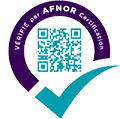

The circular economy is a concept based on the idea of putting an end to the linear economy and its produce-consume-dispose triptych. Going beyond waste management alone, it has been popularized by various movements and organizations, such as the Institut de l’économie circulaire (INEC) and theOREE association . In 2022, 87% of French people said they would prefer to buy products from companies applying circular economy principles (Source: MediaConnect). The circular economy seems to be an obvious way forward, so much so that we imagine that everything has already begun.
In reality, we’re not there yet: making flyers is complicated. Since June 2024, professionals have had an operating manual, described in three international voluntary standards: ISO 59004, ISO 59010, ISO 59020, to agree on a global vision, terminology and best practices. Discover all the solutions offered by the AFNOR group to structure a genuine circular economy approach.
What is the circular economy?
Do more and better, with less, in a loop, and on a local scale. This is the ambition of the circular economy. This anti-waste approach rethinks our modes of production and consumption to optimize the use of resources, if possible in short circuits.
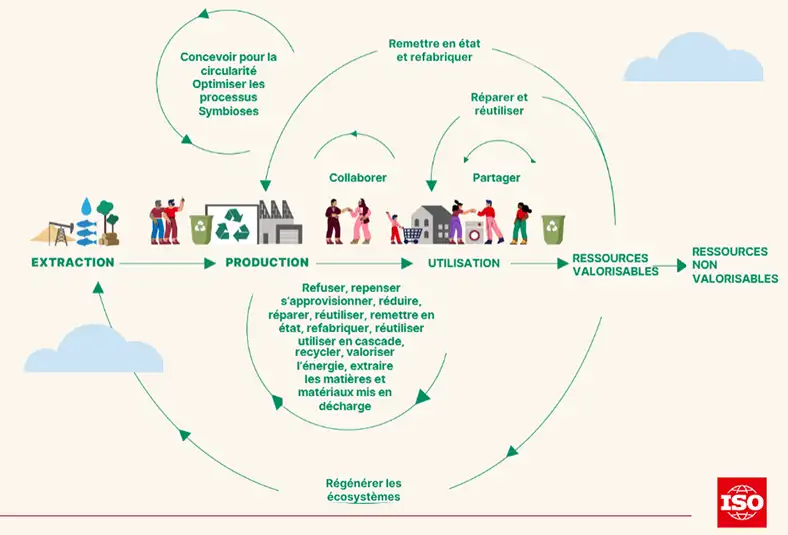
Low in carbon, energy and non-renewable natural resources, the circular economy is based on the eco-design and eco-efficiency of products and services. But it goes beyond that. It advocates responsible consumption (a third of the world’s food production is wasted!) and establishes the principle of the economy of functionality: a company no longer sells photocopiers or kitchen appliances directly, but rents them out to its customers, making them last as long as possible. The circular economy concept is too often equated with waste management alone, which, while essential, is only one aspect of it.
The circular economy can’t be improvised. The entire company is involved in this paradigm shift, which affects the entire production chain and must involve the entire organization chart. Several areas of expertise are required to bring your project to fruition.
- Developing skills and professions;
- Rethink your organization ;
- Modify production and consumption patterns, using a life cycle analysis (LCA) approach;
- Innovation at every stage of the value chain.
Life cycle analysis (LCA), diagnostics, deployment of new production and consumption methods that preserve natural resources… A wide range of expertise is mobilized to successfully transform your business model with a view to an ecological transition! Catalog of training courses to help you develop your skills and professions:
ISO 59004, ISO 59010, ISO 59020 : une définition et un mode d’emploi pour l’économie circulaire
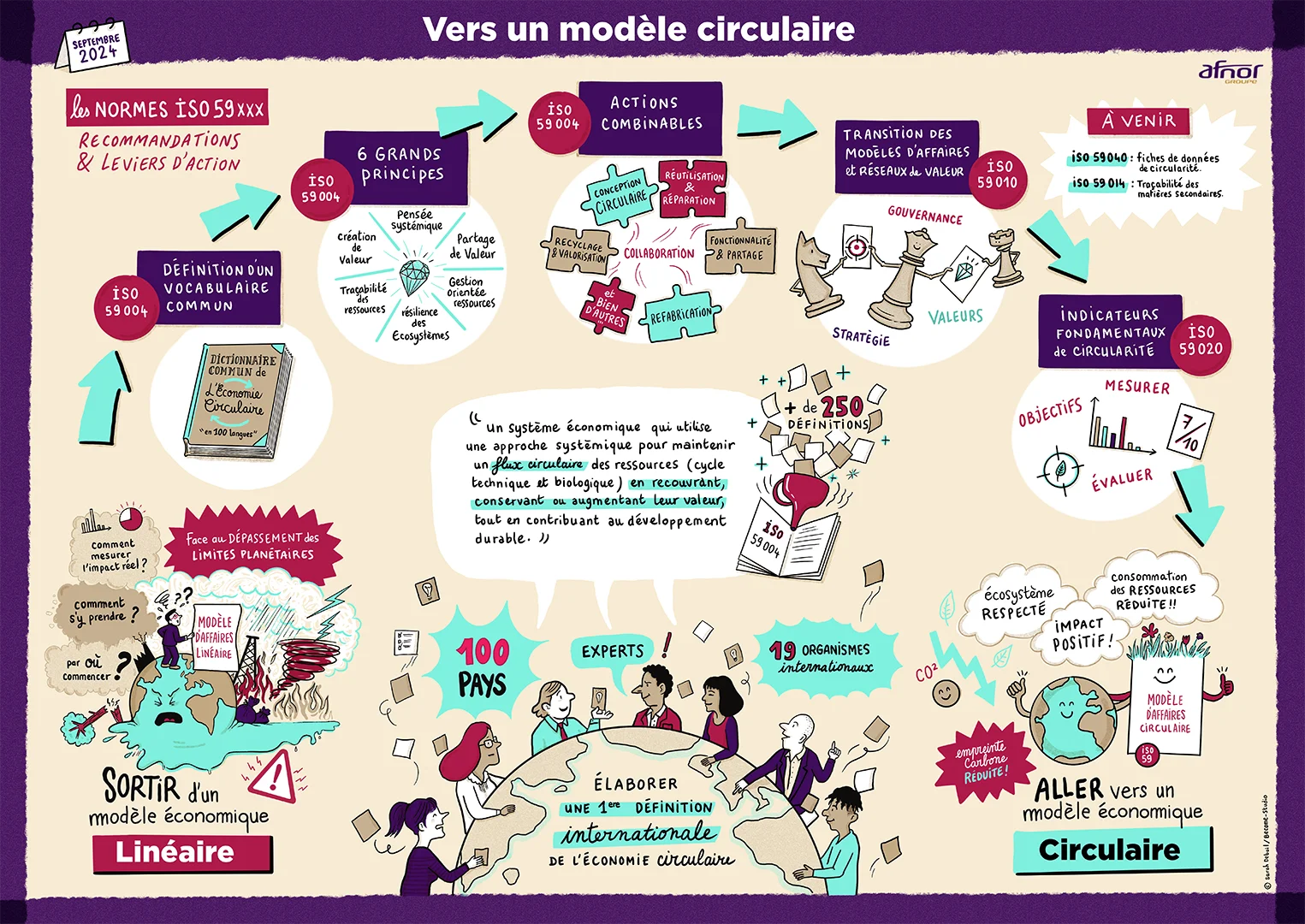
The ISO 59000 family of standards is designed to harmonize understanding of the circular economy, and to help implement and measure it. Conceived at the instigation of France and approved by professionals from 100 contributing countries and 19 international organizations, they provide methodologies and best practices. Applying them means putting all the chances on your side to succeed in your business project, with a life-cycle vision (in a systemic approach), by considering the entire scope of the circular economy, without reducing it to recycling, and by fitting in simultaneously with the three pillars of sustainable development (environmental, societal and economic).
- ISO 59004: terminology, principles and recommendations for implementation
- ISO 59010: recommendations for transitioning business models and value networks
- ISO 59020: measuring and assessing circularity
These standards are aimed at all organizations, whether public or private, and whatever their activity, to implement the circular economy.
Standard 59004 sets out the principles of the circular economy, which it defines as “an economic system that uses a systems approach to maintain a circular flow of resources, recovering, conserving or increasing their value, while contributing to sustainable development”.
The 6 interdependent and complementary principles of the circular economy are :
- Systems thinking
- Value creation
- Value sharing
- Resource management
- Traceability of resources
- Ecosystem resilience
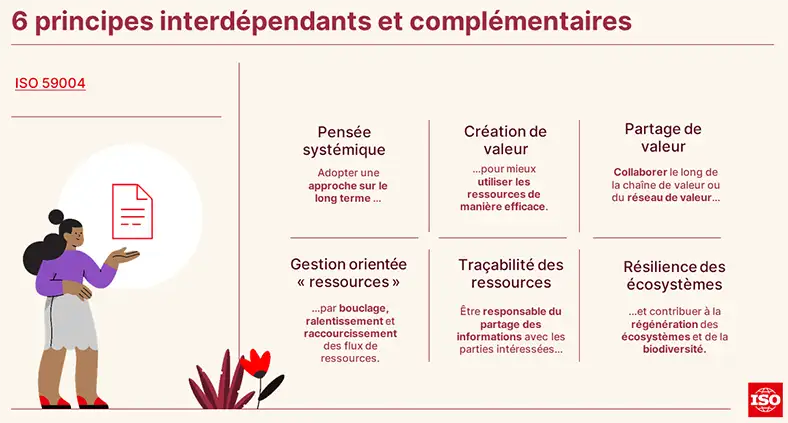
This ISO 59004 standard should be seen by organizations as a resource management tool to guide them in prioritizing actions to improve their circular economy approach. It defines the actions to be taken to reduce the pressure exerted on the environment by our economic system.
Read our dedicated article: https: //www.afnor.org/actualites/economie-circulaire-trois-normes-iso-pour-passer-a-laction/
Why take an interest in the circular economy?
- Respecting and anticipating regulatory constraints : the circular economy is now at the center of major public policies, at territorial, national and European levels. In France, it inspired a Circular Economy Roadmap (FREC) formalized in April 2018, which fed into the anti-waste law for a circular economy (AGEC) of February 10, 2020. For its part, the European Union is devoting a “Circular Economy Action Plan” to it, formalized in March 2020, as part of the Green Deal at the end of 2019. It has also introduced a number of directives promoting eco-design to reduce the environmental impact of products (RoHS, EuP, ELV, etc.).
- Get involved in an industry initiative : professional federations and unions are taking numerous steps in this area.
- Meet the demands of stakeholders (NGOs, consumers, shareholders, etc.) who are increasingly attentive to the environmental quality of products and services put on the market.
- Economic and commercial benefits: Adopting an eco-design approach can reduce production costs (raw materials, energy, etc.) and thus increase margins on eco-designed products. It can also help reduce environmental, material availability, communication and regulatory risks throughout the value chain.
- Strategic positioning: The circular economy enables us to position ourselves in new, fast-growing markets, while reinforcing our concern for the environment. It is a vector for value creation through differentiation and innovation.
The law for a circular economy (AGEC)
Aware of the importance of this approach, the government pushed through the anti-waste law for a circular economy (AGEC) of February 10, 2020 relating to the fight against waste and the circular economy. Among the main ambitions of this text are.
- halving food waste by 2030 compared to 2015;
- the end of single-use plastic packaging by 2040;
- a reparability index ;
- more precise labeling.
Through optimized resource management, the circular economy is part of the solution to these problems. Aimed at decoupling the creation of societal value from its impact on the environment, it implies the implementation of new, more sober and efficient modes of design, production and consumption (eco-design, industrial and territorial ecology, economy of functionality, etc.), and the consideration of waste as a resource. Many companies have already embarked on transforming their activities to put better resource management at the heart of the definition of their business models. While the circular economy policy is an integral part of the company’s CSR strategy , responding to most of the 17 Sustainable Development Goals (SDGs) defined by the UN, it must permeate the company’s entire strategy, involving the sales, innovation, purchasing and other departments. Indeed, all stakeholders must be mobilized to cover the entire spectrum of the circular economy, and at all stages of the value chain. It must also be central to human resources management, as it is a source of job creation and transformation. What’s more, employees are increasingly looking for meaning in their work. Including the company in its
environment and in a circular economy project can be a lever likely to
reinforce support for the entrepreneurial project.
Focus on eco-design
Eco-design is characterized by the integration of environmental criteria right from the design phase of a product or service, in order to reduce its impact throughout its life cycle. Unlike traditional design approaches, the designers’ scope is extended to the upstream stages of manufacturing, such as the extraction of raw materials and energy, and to the downstream stages of marketing, i.e. transport, product use and end-of-life management. Eco-design means helping to maximize the product’s “service/impact” ratio by taking into account :
-
- Life cycle analysis
- The functional approach
- Stakeholder expectations
To certify that its products are designed to last, reused, recycled and environmentally friendly, AFNOR Certification issues two ecolabels: Ecolabel Européen and NF Environnement.

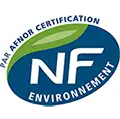
Focus on measuring and assessing circularity performance
One of the principles of the circular economy is to postpone a product’s end-of-life as far as possible. Offering products, services or processes that guarantee an extended lifespan, for the same or a different use, is good; providing proof that this is really the case, and thus convincing the buyer, is better! With this in mind, AFNOR Certification has developed a range of signs of recognition, grouped together under the name “Second Life Verification”. After verification by an independent evaluator, this is enough to have your product recognized as robust, repairable, recyclable, or the result of reuse, recycling or reconditioning.
